The Afterschool Meltdowns Are Killing Me
I have two neurodivergent kids and they spend all day trying to hold it together.

I have neurodivergent kids. I am no stranger to meltdowns. I have been navigating these emotionally intense responses in my daughters for years, and I’ve worked hard to learn their triggers so that I can jump into action before a meltdown ever occurs. But I can only control so much. And the daily after school collapse my girls experience is already killing me.
My daughters are 5 (kindergarten) and nearly 8 (first grade), and their meltdowns typically start the moment they're released from the school's care back to me. This is not an exaggeration. We walk to and from school, and at the end of the school day, a teacher leads all of the “walkers” to a spot on the sidewalk before letting them run off to meet their parents. While most of the students are happily running into big hugs with their grown-ups, my daughters are typically fighting (and there’s about a 50 percent chance one is also crying) over something minor that would have rolled off their shoulders had it happened at literally any other time of the day. And this sets the tone for our walk home.
We live a very short distance from the school, but my daughters seem to completely unravel in the five to 10 minutes it takes to get from the school to our house. They’re whining because it’s too hot, or they’re yelling because they both want to tell me about their day at the exact same time, or they’re mad because I won’t let them race each other. (I made the mistake of letting them race a few times — it never ended well.) There’s no predicting meltdown triggers during this walk home because basically, everything can be a trigger.
Most days, by the time we walk into the house, my nerves are already shot, but I have no choice but to muster up the patience and energy needed to help them regulate. I know that if I lose it on them, all that does is set us up for an even rougher evening. I know this, because I’m not perfect and I have definitely lost it on them on more than one occasion.
And I get that after school meltdowns are common for many kids. For six-ish hours a day, students are expected to follow the rules, play nicely with friends, and do as they’re told, otherwise, they will get in trouble. Adhering to these expectations can be difficult for any kid, but for neurodiverse kids, it can be especially challenging due to the way their brains are wired. In many cases, it takes a lot more mental energy for them to comply with school expectations simply because it doesn’t come naturally to them.
For instance, my youngest, who’s in kindergarten and diagnosed with autism, spends the entire school day doing not just the work that everyone else is, but also working very hard at identifying and following unspoken social norms and doing her best to hold her frustration inside whenever there is some kind of change she wasn’t expecting. My oldest, a second grader with anxiety and suspected ADHD, is making herself sit still even when her body wants to move and doing her best to ignore external distractions and her internal dialogue so that she can pay attention to her lessons. That’s called masking, and it’s incredibly draining. So it’s no wonder my kids fall apart once the school day is over — because they’ve exhausted themselves, and they know home is a place where they don’t have to mask.
Still, even though I understand the why behind their daily meltdowns, these responses can feel impossible to manage as a parent. I don’t like to be treated like an emotional punching bag. Yes, I have compassion and empathy for my daughters — I also have ADHD and know how tiring it is to mask all day — but I’m still human. By the time school is over, I’ve also put in around six hours of work and am tired and dysregulated, and it’s at the point where I dread pickup because I know what’s most likely ahead of me.
I know the positive spin here is that my kids feel safe with me, otherwise they’d continue masking. I know this, and I try to remind myself of it on a regular basis. But it’s hard to remember that when your crying 5-year-old just plops herself down in the middle of the sidewalk and your 7-year-old is yelling at her to get up because she’s “starving” and needs a snack, all while your neighbors are walking past with their kids who’ll make it all the way home before falling apart.
If there’s a workaround here, I have yet to discover it. So, my only option is to just keep showing up, take deep breaths, and hope we all make it home without too much lasting emotional damage.
Ashley Ziegler is a freelance writer living just outside of Raleigh, NC, with her two young daughters and husband. She’s written across a range of topics throughout her career but especially loves covering all things pregnancy, parenting, lifestyle, advocacy, and maternal health.